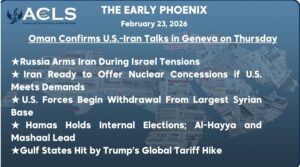Weekend Executive Summary:
Over the weekend, several key events unfolded, shaping the geopolitical landscape in the region:
- Turkiye’s Ambitions: Turkiye is actively pursuing a more dominant position in the region, focusing on enhancing its defense capabilities, technological prowess, and economic influence.
- Netanyahu’s Health Scare and Ongoing Protests: Prime Minister Netanyahu’s hospital release came after he fainted at his residence. Despite this health concern, protests against his proposed policy changes have entered their 28th week, indicating the persistence of public discontent.
- European Intervention in Libya: In response to the tragic drowning of more than 550 individuals aboard the Adrina, European ships will be deployed in Libyan waters to prevent illegal immigration. However, accountability talks seem to be stalling, prolonging the search for responsible parties.
- Saudi Arabia’s Cheese Products Drug Bust: Saudi authorities have seized 130,635 Captagon pills cleverly concealed within homemade cheese and thyme products, marking a notable success in combating drug trafficking.
- Iran’s Expanding Influence: Iran’s focus on bolstering diplomatic ties and economic growth in Africa is evident by signing 21 trade agreements across various sectors. Furthermore, Iran is keen to support Bolivia’s defense needs, further solidifying its reach in the international arena.
- Turkiye-Iraq-Syria Water Dispute: Assad has pointedly held Turkiye responsible for the water shortage predicament faced by Syria and Iraq during the Iraqi Prime Minister’s visit to Damascus, escalating regional tensions.
- Iraq’s Captagon Discovery: Iraqi authorities have made a significant breakthrough by uncovering the first Captagon raw material manufacturing plant in the southern region, signaling a significant step in combatting drug production.
- Lebanon’s Leadership Vacuum: Lebanon continues to face uncertainty as the country awaits the appointment of a president, a critical matter requiring swift resolution.
TURKIYE
- Canada Reportedly Unfreezes Talks with Türkiye on Arms Export Controls (TRT World). Canada has reportedly reopened talks with Turkiye regarding lifting export controls on drone parts, including optical equipment. The discussions were unfrozen after Turkiye approved Sweden to join NATO. Canada suspended the export of particular drone technology to Turkiye in 2020 due to concerns about its use in the conflict between Azerbaijan and Armenia.
- Türkiye and Qatar Launch Joint Investment for Chip Production (Yeni Şafak). Turkiye and Qatar have announced a joint investment for semiconductor production in Turkiye. Qatar has decided to move its investment for producing 65-nanometer chips to Turkiye, with the projected investment worth over $60 million. Turkiye aims to attract more global investors for large-scale investments in the semiconductor industry and is also focusing on accelerating investments in new-generation, hybrid, and electric vehicles.
- Istanbul Hosts ‘Business World Summit of the Century’ to Strengthen Türkiye-Azerbaijan Trade Ties (Yeni Şafak). The “Business World Summit of the Century” recently took place in Istanbul, aiming to strengthen trade ties between Türkiye and Azerbaijan. The summit celebrated the 100th birth anniversary of former Azerbaijani President Heydar Aliyev and brought together notable figures from both countries business communities. Panel discussions and networking opportunities were held to foster collaboration and enhance bilateral trade. The Albayrak Group was honored for its contributions to the Türkiye-Azerbaijan partnership, symbolizing the strong economic ties between the nations.
ISRAEL AND PALESTINIAN TERRITORIES
- Protests Swell in Tel Aviv for 28th Week as Anti-Government Movement Vows More ‘Days of Disruption’ (Arab News). Tens of thousands of protesters packed the streets of Tel Aviv on Saturday night, marking the 28th straight week of demonstrations against Prime Minister Benjamin Netanyahu’s plan to overhaul the country’s judiciary. The bill still needs to be approved in two more votes, expected by the end of the month, before it becomes law. Saturday night protests have become a mainstay of the grassroots movement — but this week’s was larger than usual.
- Top IDF Officer Tells Mayor’s Chance of Conflict with Hezbollah Appears Low (Times of Israel). IDF Northern Command Chief Ori Gordin reassured mayors of towns near the Lebanese border that the likelihood of an immediate conflict with Hezbollah is low, according to a statement from the Metula Local Council. Gordin met with municipal leaders to address concerns over recent disturbances on the border, including incidents instigated by Hezbollah.
- Prime Minister Netanyahu Released From the Hospital (Jerusalem Post). Prime Minister Benjamin Netanyahu has been released from the hospital after an overnight stay. On Saturday, he was admitted to the emergency department at Sheba Medical Center, Tel Hashomer, following a loss of consciousness and a fall at his home in Caesarea. The prime minister addressed the public from inside the hospital, attributing his condition to dehydration and urging people to stay hydrated during the heatwave.
Egypt & North Africa
- Greece Calls for the Resumption of Operation Sophia to Stem the Flow of Illegal Immigration Through Libya (Libya Akhbar). Greek Minister of Immigration, Dimitris Kyridis, called on the European Union to resume Operation Sophia, which aims to stop the flow of illegal immigrants before they leave the Libyan coast. The Greek government is facing accusations of negligence following the sinking of a wooden fishing boat after it set off from Libya towards Italy, resulting in the loss of at least 500 migrants.
- The United Nations: “Untold” Suffering in Sudan and Fears that the Conflict Will Turn Into a “Brutal” War (Al-Jazeera). The United Nations High Commissioner for Humanitarian Affairs, Martin Griffiths, has called for redoubling efforts to ensure that the conflict in Sudan does not degenerate into an “endless, brutal” civil war. Griffiths said in a statement on the 3-month anniversary of the outbreak of the fighting that the people of Sudan, over this period so far, have suffered untold suffering amid acts of violence tearing their country apart.
THE GULF REGION & YEMEN
- Hidden in “Cheese and Thyme” Boxes…Saudi Arabia Thwarts The Smuggling of 130,000 Captagon Tablets (Al Khaleej Online). The Saudi Zakat, Tax and Customs Authority announced that it thwarted an attempt to smuggle 130,635 Captagon pills found hidden in a vehicle coming to the Kingdom through the Haditha border crossing with Jordan. And the authority stated that, when inspecting one of the vehicles coming through the Haditha port, “Captagon” pills were found hidden in traditional Lebanese cheese balls covered in thyme.
- Saudi Arabia and Japan Sign 26 Agreements and Joint Memorandums (Al Mawqea Post). On Sunday, Saudi Arabia and Japan signed 26 joint agreements and memorandums of understanding in various fields ranging from renewable energy, space, technology, and artificial intelligence.This came on the sidelines of a visit by a Japanese economic and political delegation headed by Prime Minister Fumio Kishida to Saudi Arabia.Saudi Investment Minister Khalid Al-Falih said that the memorandums of understanding and agreements “will strengthen economic relations between the two countries and expand the circle of trade partnership between two major poles (Tokyo and Riyadh).
- ‘Risk Is High’: Ship Arrives to Pump Oil from Yemen Tanker (AFP). A UN-owned ship arrived off war-torn Yemen on Sunday for a risky operation to pump more than a million barrels of oil from a decaying tanker and prevent a catastrophic spill. After years of tense diplomacy between the United Nations, Yemen’s Huthi rebels, and the internationally recognized government, the Nautica entered Yemeni waters at midday and was expected to moor soon alongside the FSO Safer, a rusting super-tanker in the Red Sea. The delicate operation to transfer 1.14 million barrels of Marib light crude to the Nautica, bought by the United Nations for the operation, is expected to begin towards the end of the coming week. Despite stringent safety checks, concerns remain about a possible spill or an explosion. The Safer carries four times as much oil as the Exxon Valdez, which ran aground off Alaska in 1989.
IRAN
- Iran Ready to Supply Bolivia’s Defense Needs (Tasnim News Agency). Iran’s Defense Minister, Brigadier General Mohammad Reza Ashtiani, has expressed Iran’s readiness to meet Bolivia’s defense equipment needs and provide advanced technologies to help Bolivia counter threats. During a meeting in Tehran, Ashtiani emphasized the strategic necessity of promoting bilateral relations and called for vigilance and unity against common enemies that aim to weaken independent states. Bolivia’s Defense Minister, Edmundo Novillo Aguilar, lauded Iran’s progress in science, technology, security, and defense industry and expressed Bolivia’s readiness to cooperate with Iran in various areas, including the fight against drug trafficking.
- IRGC Commander Threatens Opponents With Full War (Iran International). Revolutionary Guard commander Hossein Salami threatened “full war” against any opposition in Iran’s oil-rich Khuzestan Province, where water shortages have caused unrest. Salami emphasized the need to protect the youth from the cultural war of the enemy and to save them from being corrupted. There are concerns that protests similar to those in 2021 may occur again due to water shortages and economic difficulties. The province has experienced water scarcity due to numerous dams and sending water to other regions for industrial purposes.
- Iran’s Raisi Seals 21 Deals on Africa Trip (Al Monitor). Iranian President Ebrahim Raisi concluded his trip to Africa with 21 cooperation agreements signed as Iran seeks to expand its influence. Raisi traveled to Kenya, Uganda, and Zimbabwe during his visit. The agreements covered various areas, including agriculture, communications, culture, and vocational training. Iran aims to strengthen ties with sub-Saharan Africa. However, it faces competition from other countries like China and Gulf states, who have been actively engaging with African nations in infrastructure and energy sectors.
- Iraq Deploys More Troops on Border with Iran (Tehran Times). Iraq has increased its deployment of border guards and surveillance equipment along its border with Iran. The Iraqi Ministry of the Interior announced plans to deploy additional troops, install turrets and cameras, and establish border posts on the Iraq-Iran border. This move is part of efforts to enhance border control and prevent infiltration and smuggling. The deployment aligns with a security agreement signed between Iran and Iraq, which requires Iraq to exert greater control over its border and disarm Iranian Kurdish separatist groups based in Iraqi Kurdistan.
- US Boosting Deterrent Power In The Persian Gulf Against Iran (Iran International). The Pentagon has announced plans to deploy additional F-16 fighter jets to enhance deterrence against Iran in the Persian Gulf. The US employs A-10 fighter jets to patrol the region, particularly the Strait of Hormuz, to safeguard commercial shipping from Iranian attempts to seize oil tankers. Iran has been involved in harassing commercial shipping and has seized multiple vessels in recent years. The US intends to ensure freedom of navigation in Middle East waterways and is concerned about Iran’s military cooperation with Russia and aggressive actions in Syria.
- Old Dissident Says Ready to Go to Jail in Khamenei’s Dictatorship (Iran International). A staunch opponent of Iran’s Supreme Leader who received a 10-month jail sentence has said he is ready to go to prison “in Ali Khamenei’s dictatorial regime.” Abolfazl Qadiani (Ghadiani), a 78-year-old former Islamic-leftist revolutionary and Khamenei’s comrade-in-arms has become uncompromising in his criticism. The former revolutionary said that the religious dictatorship has combined “bribes, force, and deception” to rule.
SYRIA
- Postponement of the Proceedings of the Netherlands and Canada Case at the International Court of Justice Against the Syrian Regime (Syria TV). On Saturday, the International Court of Justice announced the postponement of the proceedings in the case of the Netherlands and Canada against the Syrian regime on charges of committing torture crimes against Syrians. The court said in a statement that the main judicial body decided to postpone the public hearings scheduled to open on Wednesday, July 19, 2023, to October 10 and 11, 2023.
- Iraq’s PM Visits Assad to Discuss Security and Natural Resources (Al Araby Al Jadeed). An Iraqi official confirmed, on anonymity, that “Al-Sudani will discuss the file of the Iraqi-Syrian border with his Syrian counterpart. Topics include stopping the infiltration of militants and drug traffickers, increasing intelligence sharing, and the problem of the al-Hol camp.
- Saudi Arabia Calls on the Syrian Regime to Fully Cooperate with the Organization for the Prohibition of Chemical Weapons (Syria TV). The Kingdom of Saudi Arabia called on the Syrian regime to cooperate with the Technical Secretariat of the Organization for the Prohibition of Chemical Weapons while welcoming the meeting of regime representatives with the Secretariat team in Beirut. This came in the speech of the Saudi ambassador to the Netherlands, Ziyad Al-Attiyah, during the meeting of the 103rd session of the Executive Council of the Organization for the Prohibition of Chemical Weapons, which was held in The Hague from 11 to 14 July.
- America is Installing the “HIMARS” Missile System in Deir Ezzor (Syria TV). US forces recently brought the Himars missile system to their bases in Deir Ezzor Governorate, eastern Syria. The sources added that the system entered Syria from Iraq and was deployed at the Al-Omar base, considered one of the largest US bases in Syria. The areas of contact between the Syrian regime and the areas controlled by the “SDF” and the US forces are witnessing military build-ups, the first of their kind in the vicinity of the “Al-Omar oil field” and “Koniko” natural gas bases and the neighboring towns.
IRAQ
- The First Captagon Production Plant Was Seized (Sky News). The Iraqi authorities announced, on Sunday, that they had seized a Captagon production plant in the Muthanna Governorate, in the south of the country, for the first time. “Today, perhaps for the first time, a laboratory for the manufacture of narcotic substances has been seized,” said Saad Maan, Director of Relations and Information at the Iraqi Ministry of Interior, in a short video posted on social media platforms. The statement indicated that “the laboratory is prepared for the manufacture of the narcotic Captagon pills, with raw materials estimated at twenty-seven and a half kilograms, with the seals of the narcotic pills.”
- Ministry of Electricity Says it Will Go to Qatar, Turkmenistan to Secure Gas and Reduce Reliance on Iranian Gas (Al Iraq News). On Sunday, the Minister of Electricity, Ziyad Ali, announced that he is going to Qatar and Turkmenistan to secure gas for power plants. The head of the committee, Muhammad Nuri al-Abd Rabbo, asked the minister about the reasons for the decrease in supply and the ministry’s plan to find alternatives to importing Iranian gas and moving towards renewable energy.
LEBANON
- Five Nation Talks about Lebanon in Doha (Al Nahar). Eyes will turn Monday to the meeting of the five-nation committee on Lebanon that will be held in the Qatari capital Doha. The committee comprises representatives of the United States, France, Saudi Arabia, Qatar, and Egypt. French presidential envoy for Lebanon Jean-Yves Le Drian will attend the meeting.“The meeting’s outcome will decide Le Drian’s next move,” Annahar newspaper reported on Sunday. Quoting reports, the daily added that U.S. Ambassador to Lebanon Dorothy Shea will also participate in the meeting.
- Hezbollah Mourns Death of Senior Cleric (Al Manar). Hezbollah started to mourn the loss of Sheikh Naboulsi, stressing that his eminence spent his life worshipping God and supporting the Resistance against the Israeli occupation despite all costs. Supreme Leader of the Islamic Revolution in Iran, Sayyed Ali Khamenei, addressed Hezbollah Secretary General Sayyed Hasan Nasrallah on the death of Sheikh Naboulsi, offering condolences to the later cleric’s family and all the mujahideen in Lebanon and Palestine. The Lebanese politician and thinker Maan Bashour indicated that the late cleric was one of the prominent resistance fighters in southern Lebanon, adding that he was the companion of Martyr Sheikh Ragheb Harb and cooperated with Hezbollah Secretary General Martyr Sayyed Abbas Moussawi.



